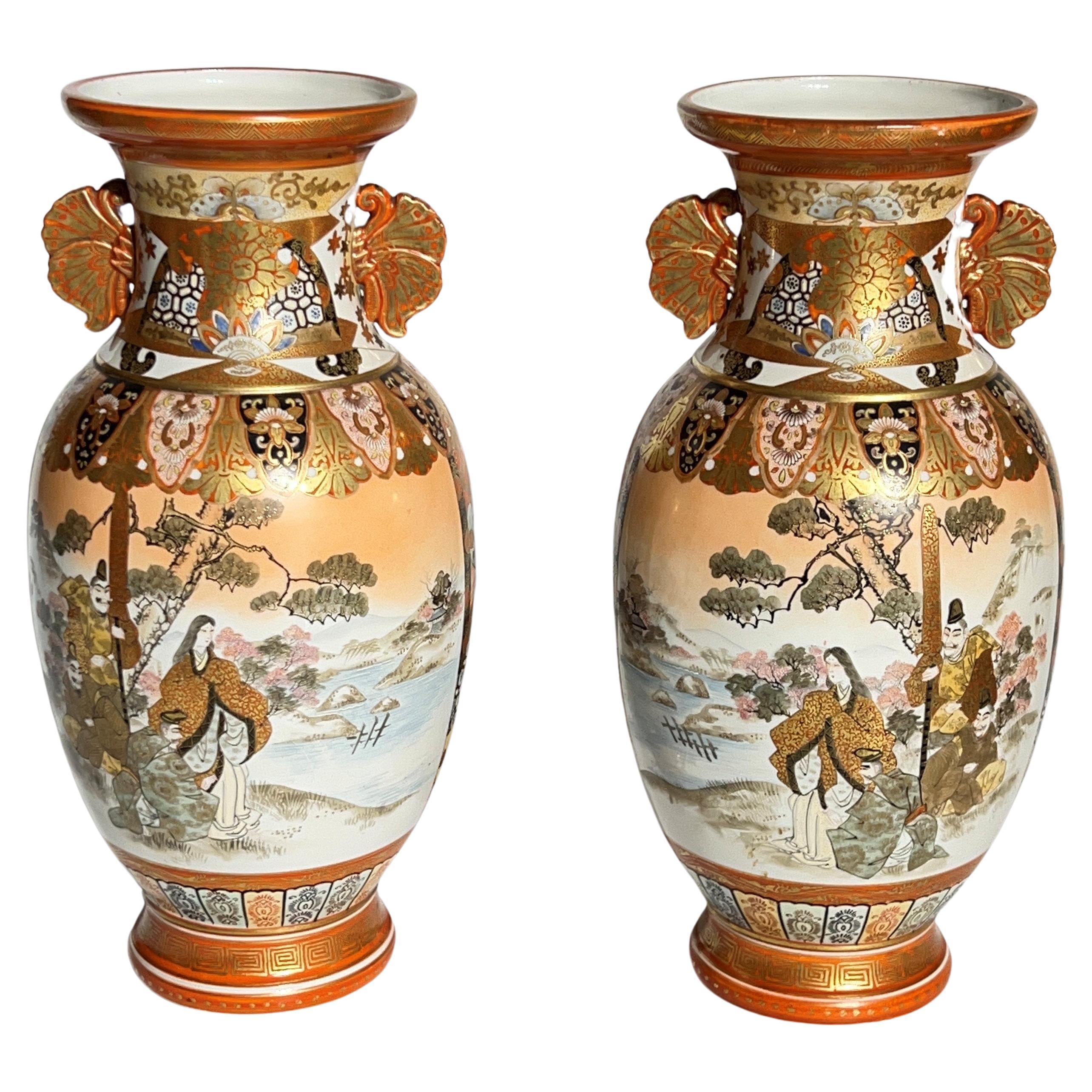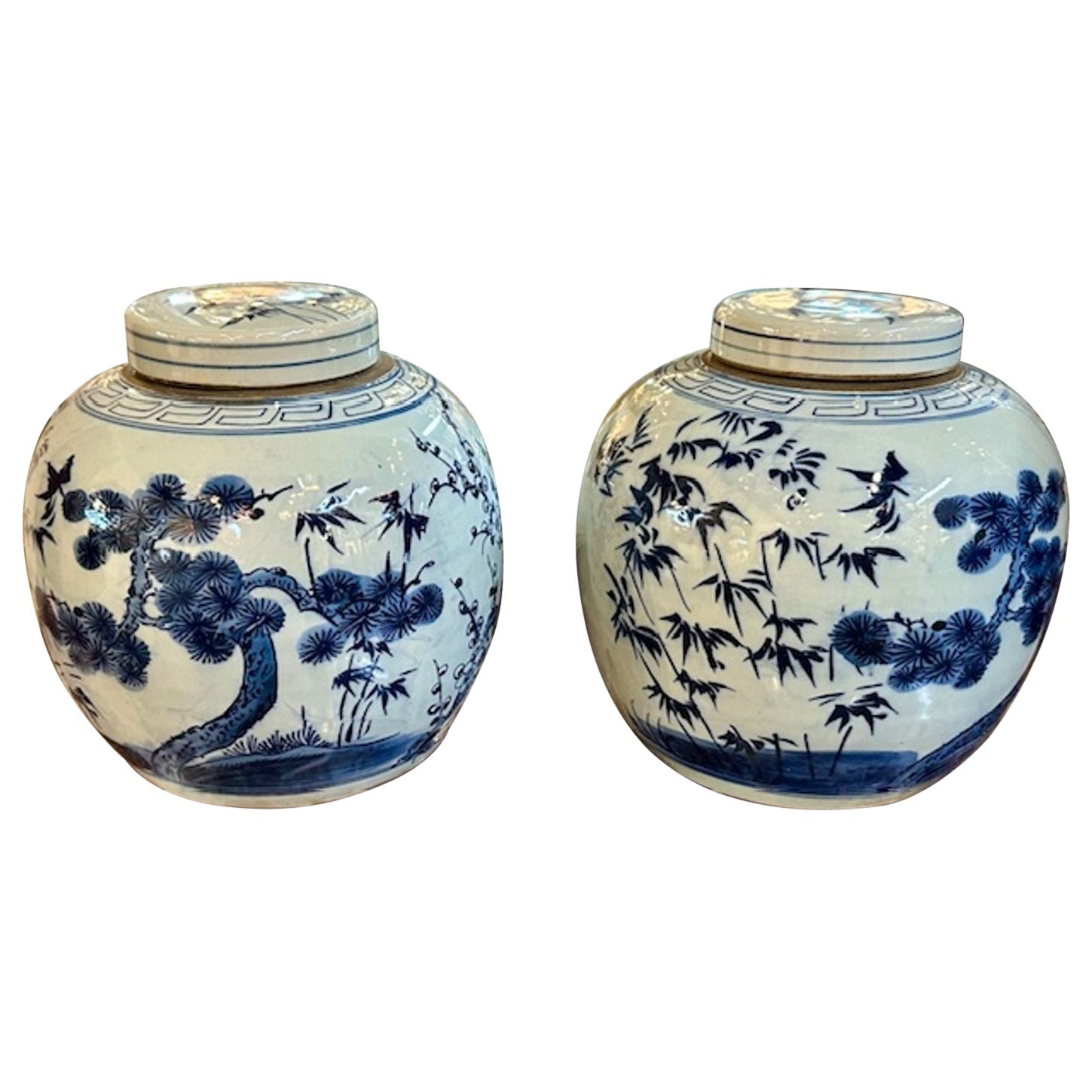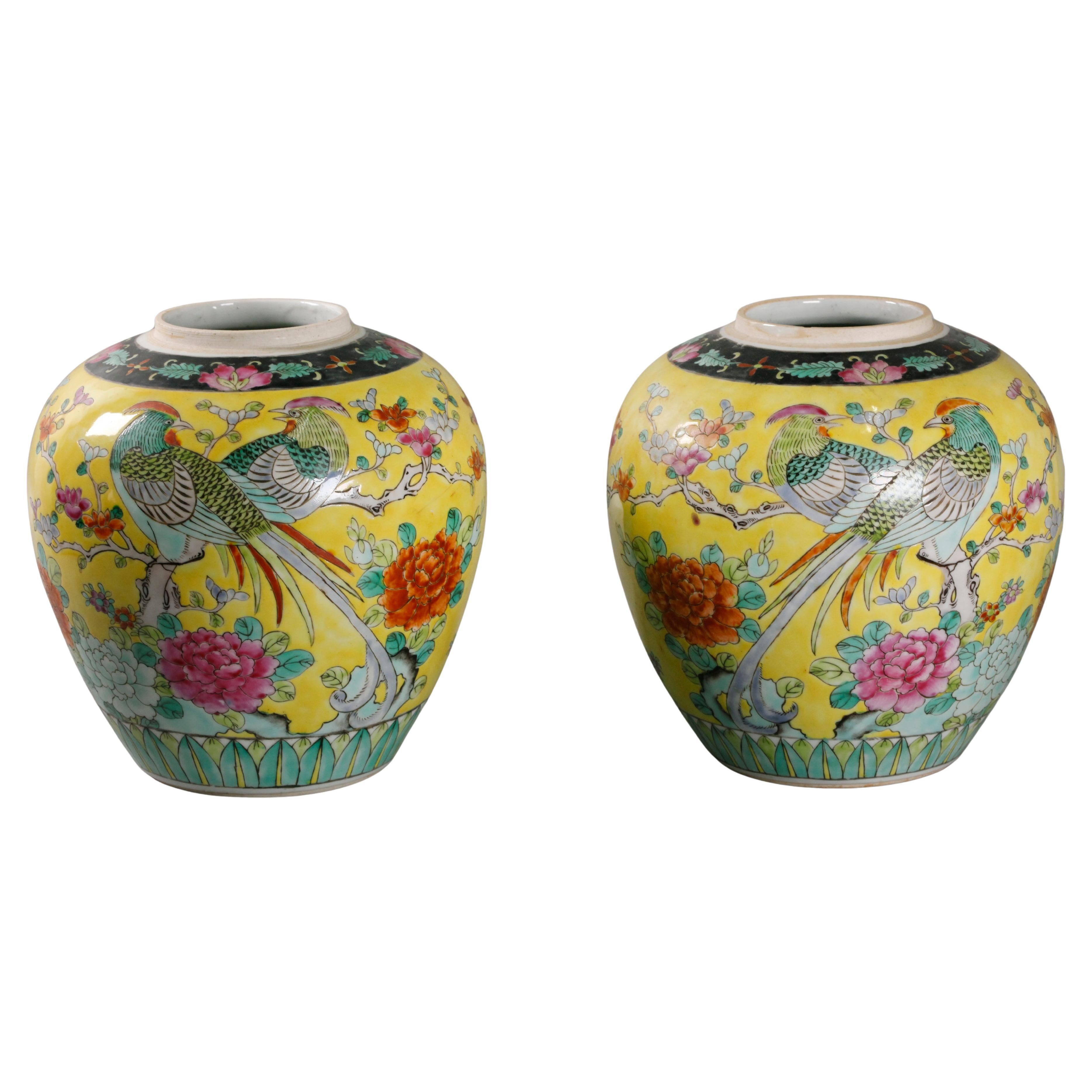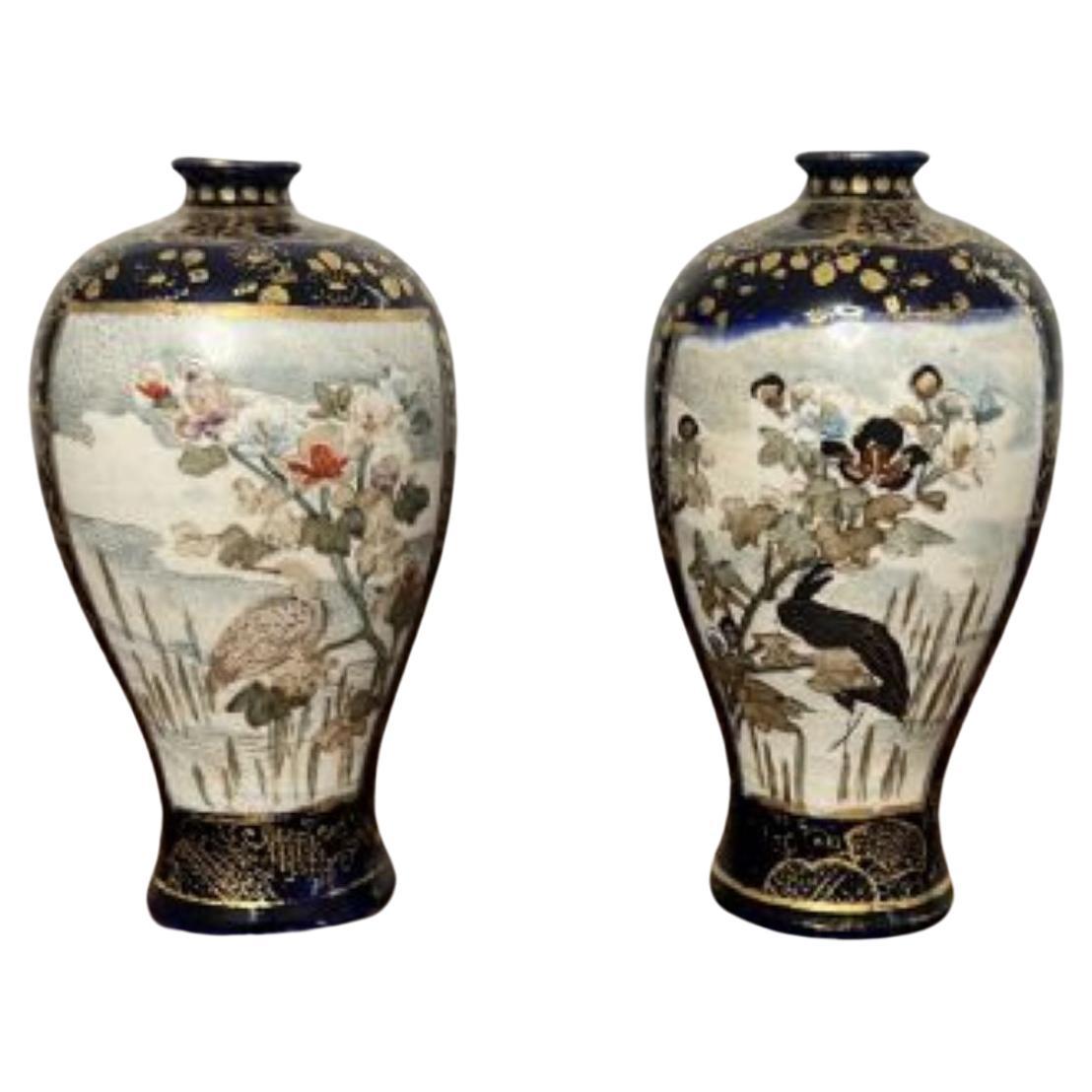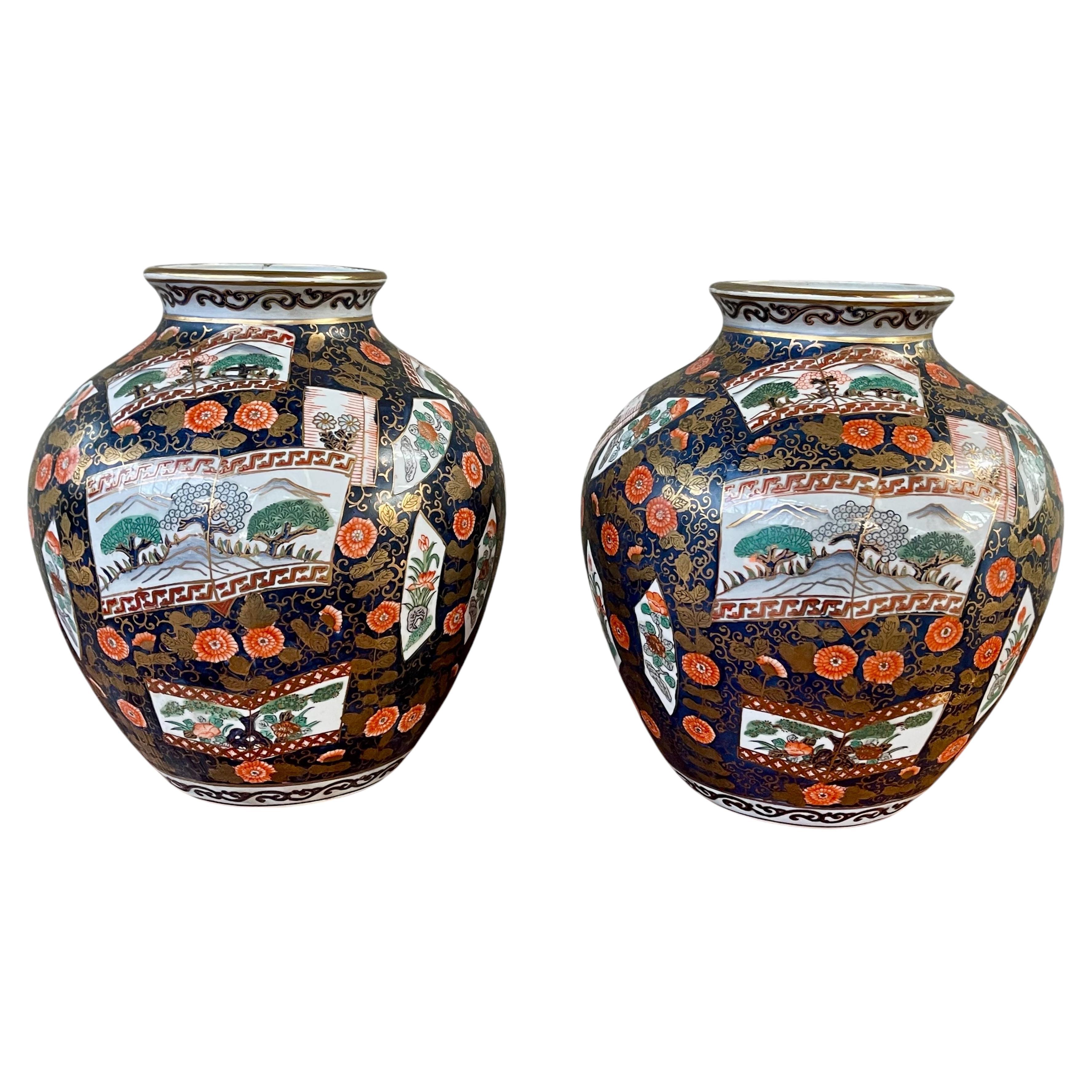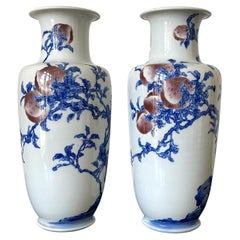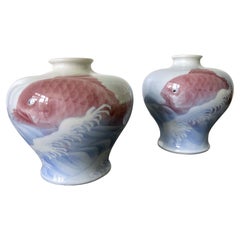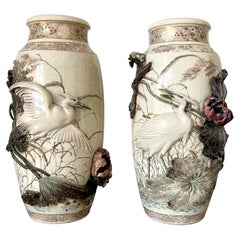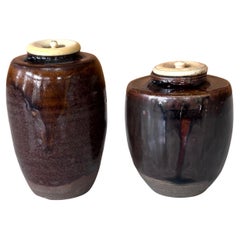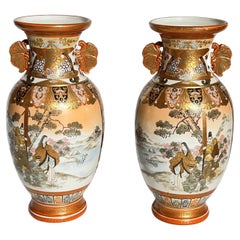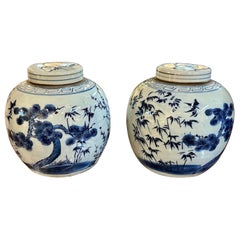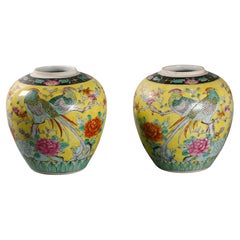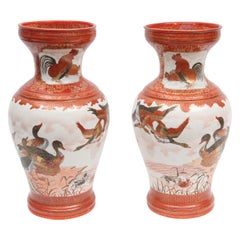Items Similar to Near Pair of Antique Japanese Arita Export Ceramic Jars
Want more images or videos?
Request additional images or videos from the seller
1 of 11
Near Pair of Antique Japanese Arita Export Ceramic Jars
$3,600per set
£2,733.57per set
€3,126.04per set
CA$5,029.72per set
A$5,594.15per set
CHF 2,921.09per set
MX$68,074.84per set
NOK 37,306.79per set
SEK 34,987.18per set
DKK 23,330.80per set
Shipping
Retrieving quote...The 1stDibs Promise:
Authenticity Guarantee,
Money-Back Guarantee,
24-Hour Cancellation
About the Item
A near pair Hizen pottery jars from Artia Japan, circa mid-19th century of the Meiji Era. Heavy stoneware construction with overglaze enamels that was inspired by Chinese WuCai from Ming dynasty. The lovely patterns depicts flying phoenix over peonies, plum trees in blossom, and small windows of landscapes, all of which are classic auspicious designs found in Japanese and Chinese export porcelain, made for the western market. These export were shipped out of Imari port thus became known later in the west as Imari Ware.
These two jars are a near pair with slight differences in size and design (one jar does not have the scrolling pattern on the lower part near the base). They might be jars with the lids missing. On the base, they are both marked as "Zoshuntei Sanpo Zo", which means "made by Zoshun Pavailion (name of the shop) Sanpo (name of the potter)". This is an early company trademark, in use between 1842 to 1870. The owner was Hisatomi Yojibei Masatsune, one of the first potters in the area of Arita and Mikawachi who was granted an export permit by the Lord Nabeshima Naomasa (1814-1871) in 1842. This was also the first time it was allowed to put a signature on pieces exported from Arita, other than Fuku (Happiness) or various copies of Chinese reign marks. His business was succeeded by Masatsune's oldest son, Masayasu (1812-1878) and his younger brother, Yohei Masaoki (1832-1871) until Yohei's sudden death in the sea.
- Dimensions:Height: 12.25 in (31.12 cm)Diameter: 10.5 in (26.67 cm)
- Sold As:Set of 2
- Style:Japonisme (Of the Period)
- Materials and Techniques:
- Place of Origin:
- Period:
- Date of Manufacture:1850s-1870s
- Condition:Wear consistent with age and use. Some surface wear in keeping with the age, no damages noticed.
- Seller Location:Atlanta, GA
- Reference Number:1stDibs: LU945013660052
About the Seller
4.9
Platinum Seller
Premium sellers with a 4.7+ rating and 24-hour response times
Established in 2006
1stDibs seller since 2010
564 sales on 1stDibs
Typical response time: <1 hour
- ShippingRetrieving quote...Shipping from: Atlanta, GA
- Return Policy
Authenticity Guarantee
In the unlikely event there’s an issue with an item’s authenticity, contact us within 1 year for a full refund. DetailsMoney-Back Guarantee
If your item is not as described, is damaged in transit, or does not arrive, contact us within 7 days for a full refund. Details24-Hour Cancellation
You have a 24-hour grace period in which to reconsider your purchase, with no questions asked.Vetted Professional Sellers
Our world-class sellers must adhere to strict standards for service and quality, maintaining the integrity of our listings.Price-Match Guarantee
If you find that a seller listed the same item for a lower price elsewhere, we’ll match it.Trusted Global Delivery
Our best-in-class carrier network provides specialized shipping options worldwide, including custom delivery.More From This Seller
View AllPair of Rare Porcelain Commemorative Vases by Makuzu Kozan Meiji Period
By Makuzu Kozan
Located in Atlanta, GA
A pair of porcelain vases in classic form, decorated with underglaze blue and copper red painting by Imperial potter Makuzu Kozan. Also known as Miyagawa Kozan (1842–1916), Makuzu was one of the most established and collected ceramist known to the west from Meiji Period.
The vases are in a classic Chinese form called "Bang Chu Ping" (grain-mallet vase...
Category
Vintage 1910s Japanese Japonisme Ceramics
Materials
Ceramic
One of The Two Japanese Ceramic Vases Makuzu Kozan Meiji Period
By Makuzu Kozan
Located in Atlanta, GA
Two small nearly identical ceramic vases by Japanese Meiji imperial potter Makuzu Kozan (1842-1916), circa 1890-1900s. The vases were made in the form of jarlet with swelled shoulder...
Category
Antique Late 19th Century Japanese Japonisme Ceramics
Materials
Ceramic
Rare Pair of Early Period Makuzu Kozan Takauki High-Relief Vases
By Makuzu Kozan
Located in Atlanta, GA
A stunning pair of ceramic vases with gilt, paint and high-relief decoration by imperial artist Makuzu Kozan (1842-1916, also known as Miyagawa Kozan) circa 1876-81 (late Meiji period). These vases belong to early period (1876-1881) of Kozan's repertoire, during which time the high relief sculpturing (known as Takauki ware) was used as a distinguished technique on top of the traditional gilt and paint ornaments of satsuma ware. Due to the relatively limited production and the fragile nature of these wares, not a large quantity of the examples remained in the first place, not mentioning a fine matching signed pair in such impressive sizes.
Not only a rarity, this pair of vases is also superb in workmanship, thus the fine example of the work from that short and unique period of the artist's career before he switched to the underglaze period. In a conceptually mirrored fashion, the surface is richly decorated with flying cranes among large lotus leaves and flower, like an idyllic aqua scenery of pure poetry on a circular scroll. The high-relief appliques were rendered and composed in realistic fashion but with a dramatic touch. They are literally about to break the surface free, alive and in motion. The dark colors of the glaze were used to set a moody tone. The approach to create this type of ornamentations is more akin to sculpturing an ink painting in three-dimension than ceramic making. It is not hard to imagine the demand of both the artistry and the technique.
Both vases were signed as "Makuzu Kozan Kiln" and each further with another name and seal, which are most likely the individual artist involved in the making process. Similar signatures can be seen in the reference book below.
For similarly Takauki vases, see Miyagawa Kozan Makuzu...
Category
Antique 1870s Japanese Japonisme Ceramics
Materials
Ceramic
Set of Two Antique Japanese Ceramic Ko-Seto Chaires
Located in Atlanta, GA
A collection of two ceramic chaires (Tea caddies) of Ko-seto ware type from Edo period Japan circa 17-18th century. This type of small jar was made of stoneware in old Seto kilns in ...
Category
Antique 18th Century Japanese Edo Ceramics
Materials
Ceramic
Pair of Fine Miniature Satsuma Vase with Moriage Enamel Decoration by Seikozan
Located in Atlanta, GA
A pair of small ceramic vases with superb surface decorations made by Japanese studio Seikozan circa 1890-1910s (late Meiji Period). One of the many artist studios that specialized i...
Category
Antique 1890s Japanese Meiji Ceramics
Materials
Ceramic
Large Korean Ceramic Jar Joseon Dynasty
Located in Atlanta, GA
A large Korean white porcelain jar with underglaze decoration circa late 19th century of Joseon Dynasty. The vase has a well-proportioned profile of a classic jar (known as Hangari in Korean and was being produced since 18th century from Punwon-ri Kilns) with a tall upright neck that extends to a generous opening and swelled rounded shoulder that tapers down toward the base. Many of these porcelain jars were decorated with underglaze cobalt blue painting...
Category
Antique 19th Century Korean Other Ceramics
Materials
Ceramic
You May Also Like
Pair Japanese Kutani Porcelain Vases
Located in New York, NY
Pair of exquisite Japanese Kutani vases with fine enameled and gilt decorations, signed Kutani-Saku (九谷作), measuring 14 1/2 by 6 1/2 inches. Each in excellent condition.
Category
Antique Early 1900s Japanese Ceramics
Materials
Porcelain
$2,200 / set
Pair of Vintage Chinese Covered Jars
Located in Dallas, TX
Pair of Vintage Chinese export porcelain blue and white covered jars. Circa 1920. A timeless and classic touch for a fine interior.
Category
Vintage 1920s Jars
Materials
Porcelain
$1,036 Sale Price / set
20% Off
pair of Chinese porcelain jars, 19th c.
Located in New York, NY
decorated with birds amongst various flowers on yellow ground
Category
Antique Late 19th Century Chinese Antiquities
Materials
Porcelain
$1,500 / set
Pair of 19th Century Japanese Porcelain Kutani Vases
Located in Los Angeles, CA
Pair of late 19th century Japanese hand-painted and gilded porcelain kutani vases. These vases are signed.
Category
Antique 19th Century Japanese Ceramics
Materials
Porcelain
Fantastic quality pair of small antique Japanese satsuma vases
Located in Ipswich, GB
Fantastic quality pair of small antique Japanese satsuma vases having a quality pair of antique Japanese satsuma vases with wonderful hand painted decoration of figural and landscape...
Category
Early 20th Century Vases
Materials
Ceramic
Pair of 20th Century Japanese Amari Vases
Located in Southall, GB
These 20th-century Japanese Amari vases in navy with gilt-painted floral and woodland scenes are a beautiful example of Japanese craftsmanship and artistic expression, blending tradi...
Category
Late 20th Century Ceramics
Materials
Ceramic
$795 / item
More Ways To Browse
Japanese Arita
Arita Imari
Small Antique Windows
19th Century Japanese Ceramic
Japanese Peony
Japanese Porcelain Jar
Japanese Lidded Jar
Japanese Export Porcelain
Japanese Export 19th
Imari Jar
Japanese Imari Jars
Antique Japanese Arita
Imari Lidded Jars
Japanese Imari Jar Lid
Chinese Arita China
Japanese Antique Jar
Antique Stoneware Jars
Antique Japanese Stoneware
